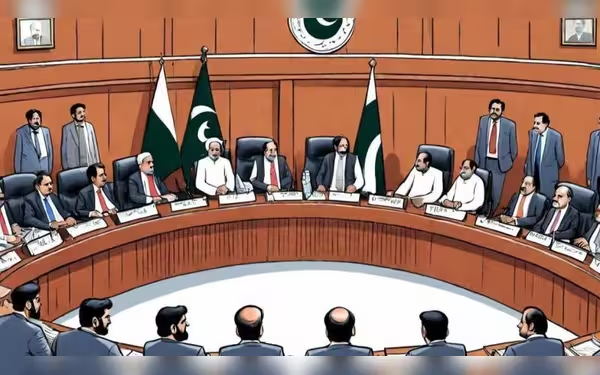Thursday, November 7, 2024 10:49 AM
Parliamentary Research's Impact on Political Polarisation in Pakistan
- Political polarisation hinders governance and public dialogue.
- Parliamentary Research Service fosters collaboration among factions.
- Media and social platforms exacerbate political divides.
 Image Credits: thefridaytimes
Image Credits: thefridaytimesExplore how parliamentary research can address political polarisation in Pakistan, fostering collaboration and understanding among political factions.
The phenomenon of political polarisation has become a pressing issue in many democracies around the world, including Pakistan. Political polarisation refers to the growing divide in political beliefs and ideologies, where individuals or groups align themselves with opposing extremes. This division can hinder meaningful dialogue and cooperation, making it difficult for governments to address the needs of their citizens. In recent times, the role of parliamentary research has emerged as a crucial tool in addressing this polarisation, fostering understanding and collaboration among political factions.
During a recent seminar held in Seoul, South Korea, delegates from over 24 parliaments gathered to discuss various aspects of parliamentary research. This event, organised by the National Assembly Research Services (NARS) of Korea, provided a unique platform for participants to share insights and learn from one another. The seminar highlighted the importance of research in shaping legislative practices and addressing the challenges posed by political polarisation.
In Pakistan, political polarisation is particularly pronounced, with major political parties often at odds with one another. This fierce competition is not merely about differing leadership styles or policy approaches; it reflects deep ideological divides that have taken root in the political landscape. The inability of political parties to collaborate on governance and economic policies exacerbates tensions, leading to a fragmented society where public opinion is sharply divided.
The media plays a significant role in perpetuating this divide. With the rise of partisan media outlets, which cater to specific political factions, public opinion becomes increasingly polarised. These outlets often present news and opinions that reinforce existing beliefs while dismissing opposing perspectives. As a result, citizens are less exposed to diverse viewpoints, which diminishes the media's role as an objective source of information.
Social media has also transformed the flow of information, creating both opportunities and challenges. While platforms like Facebook and Twitter have made information more accessible, they can also spread misinformation rapidly. Algorithms designed to maximise engagement often promote exaggerated or controversial content, further entrenching polarised narratives and deepening societal divisions.
Judicial intervention in political matters has added another layer of complexity to the situation. In Pakistan, the judiciary has been called upon to resolve disputes between political factions, leading to perceptions of bias and undermining public trust in democratic institutions. Historical factors, such as undemocratic interventions and dynastic leadership, have also contributed to the current state of political polarisation, making it difficult for new leaders to emerge and for diverse voices to be heard.
One of the most significant consequences of political polarisation is legislative gridlock. In a deeply divided political environment, parties often focus on advancing their own agendas rather than seeking compromise. This paralysis hampers governance, delaying essential reforms in areas like healthcare and national security. As citizens grow frustrated with the lack of action on pressing issues, public trust in political institutions erodes.
The role of the Parliamentary Research Service (PRS) is vital in mitigating political polarisation. By providing non-partisan research and analysis, the PRS can help bridge the gap between opposing factions, fostering a culture of collaboration and understanding. Through informed discussions and evidence-based policymaking, parliamentary research can pave the way for constructive dialogue and compromise.
Addressing political polarisation requires a multifaceted approach that includes enhancing the role of parliamentary research. By fostering understanding and collaboration among political factions, we can work towards a more cohesive society. It is essential for political leaders, researchers, and citizens alike to engage in meaningful dialogue, ensuring that diverse perspectives are heard and valued. Only then can we hope to overcome the challenges posed by political polarisation and build a more united future for Pakistan.













